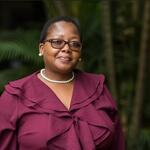Blog
Celebrating gender diversity and leading with impact
In celebration of South Africa's Women's Month, SA-TIED is spotlighting the women driving change within the field of economics. Through the ‘Breaking Barriers, Building Economies: Women in Economic Policy’ campaign, we highlight their achievements, challenges, and invaluable contributions. Mamiky Leolo is one such changemaker who embodies the essence of the campaign. As a contributor to SA-TIED´s, Leolo demonstrates exceptional leadership skills and is committed to evidence-based economic policymaking.
In the world of economic policymaking, historical norms often give prominence to men over women. However, my journey, starting with my entry into the South African Revenue Service (SARS) as a Risk Specialist in the Enforcement Division back in 2002, and subsequently advancing to head the Macro Economic Research unit, has been characterized by a commitment to challenging these norms and advocating for gender equity. This dedication has guided me through various roles, each shaping my identity as a woman leader.
Empowering through advocacy and collaboration
From my early days as a risk specialist to my present role, every stride has reinforced my conviction in the potential inclusivity has to drive innovation and cultivate diverse perspectives. Promoting inclusivity is challenging. Instead of shying away from obstacles, I have chosen to embrace them as opportunities. It is important to reshape norms and contribute to a more diverse and equitable economic environment through strategic advocacy and by acknowledging the valuable contributions of women.
A pivotal moment in my career came when I was nominated to participate in the SA-TIED programme. Collaborating with the National Treasury, UNU-WIDER, and other international partners, I co-led SA-TIED’s work stream on public revenue mobilization for inclusive development. This opportunity provided a platform to amplify underrepresented voices inside of economic policymaking.
In addition to supporting the National Treasury Secure Data Facility (NT-SDF) since its 2019 inception, I also played a role in publishing the Tax Statistics bulletin. The 2022 edition marked the bulletin's 15th release. Witnessing firsthand how tax administrative data empowers researchers, I have observed the emergence of valuable empirical studies that enrich our understanding of the policy landscape. This data consistently guides policy decisions, leading to more informed fiscal measures. Its availability benefits policy and academic research and aids students in their thesis endeavours, thereby contributing to the field of taxation and advancing their educational pursuits.
In 1996, the UN made a statement declaring their commitment to women's rights: ‘gender bias is undermining our social fabric and devalues all of us. It is not just a human rights issue; it is a tremendous waste of the world’s human potential. Aligned with this quote, I have always tried to do my best to nurture diversity and combat underrepresentation within my work environment. An aspect of my role involves identifying, recruiting, and mentoring talent aimed at propelling the organization toward heightened performance levels, exemplified in the graduate internship programme, collaborative initiatives with pertinent support units to foster existing talent, and, most recently, the facilitation of a seamless transition for departing talent.
Advancing gender inclusivity
I was privileged to recently participate in the ATAF BRICS Joint Women in Tax Virtual Conference, an experience that resonated with my commitment to advancing gender diversity. The conference illuminated a path forward by outlining actionable measures to bridge the gender gap. Proactive efforts in creating diverse workforces, fortified by unwavering institutional and leadership support, are integral. Equally crucial is establishing collaborative ecosystems that embrace the contributions of every voice.
Moreover, organizations must invest in the holistic empowerment of women, not only within their ranks but across society, thus unlocking their potential as catalysts for change. Reflecting on this, I am happy to be part of the SA-TIED programme. It offers a platform for my work and is a transformative force, enabling me to channel my dedication into evidence-based policy contributions. SA-TIED's commitment to inclusivity supports women's perspectives and experiences to have impact, steering us toward equitable policies that reflect the diverse tapestry of our society.
As we celebrate Women's Month in South Africa, I am encouraged by the belief that our collective efforts, underpinned by these insights, will usher in a new era of economic policymaking—where gender equality thrives, barriers dissolve, and inclusivity becomes the cornerstone of a more just and prosperous future.
Mamiky Leolo serves as the Executive Manager of the Macro Economic Research unit within the National Revenue and Compliance Management Division at the South African Revenue Services (SARS).
The views expressed in this piece are those of the author(s), and do not necessarily reflect the views of the Institute or the United Nations University, nor the programme/project donors.
 Join the network
Join the network